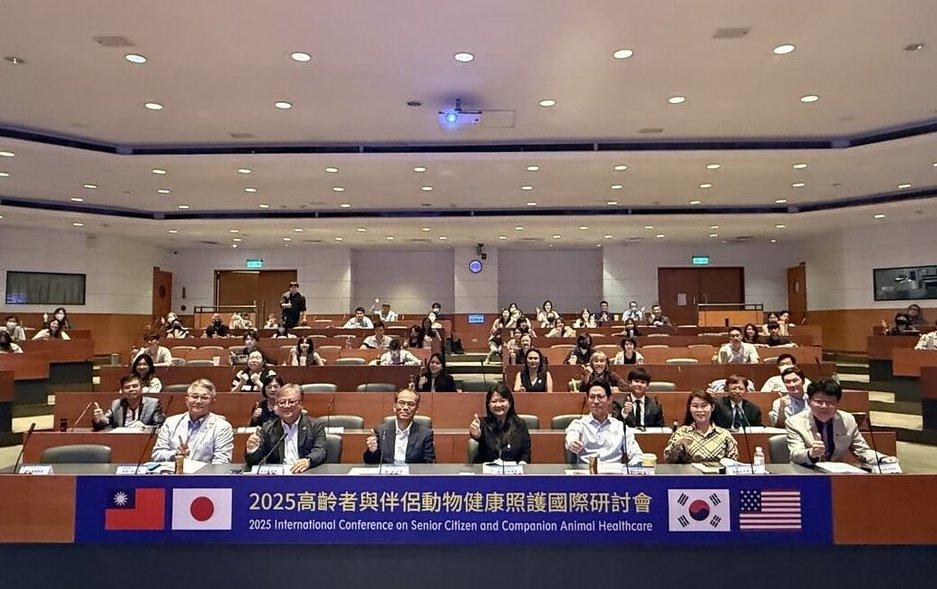The use of pet products utilizing artificial intelligence (AI) such as feeders, water dispensers and litter boxes is rising, reducing the burden of pet care especially among seniors, a recent study by a Hungkuang University professor found.
The university on Monday last week held the “International Conference on Senior Citizen and Companion Animal Healthcare,” inviting academics from Taiwan, the US, Japan and South Korea to participate.
Hungkuang University Department of Animal Healthcare professor Hou Chih-yuan (侯志遠) said that one key reason people in Taiwan raise pets is to provide companionship for older family members, citing surveys conducted from 2015 to last year at pet expos around Taiwan.

Photo: CNA
This reason accounted for 12.7 percent of pet ownership last year, up from 10.5 percent in 2023, Hou’s study found.
In addition, 76.8 percent of pet owners had AI pet products last year, up from 74.5 percent in 2023, Hou said.
These products include automatic feeders, water dispensers, cat litter boxes and blow-drying boxes, he said.
Automatic feeders were the most common, with 20.7 percent of pet owners using them last year, up from 17.6 percent in 2023, he said.
This shows that modern pet owners lead busy lives and the product helps reduce the burden of pet ownership, he added.
Topics discussed at the conference include caring for older pets with cardiovascular issues, the development of Taiwan’s pet industry and its international integration, and how to use basic natural medicine to care for seniors and their pets.
The conference was organized by the department and the Asia-Pacific Animal Surgical Center, with assistance from the university’s Department of Senior Citizen Welfare and Long-Term Care Business, Department of Nutrition and Department of Hair Styling and Design.
In his remarks, university president Shu Hung-yee (蘇弘毅) said that more than 65 percent of conference attendees are from the pet industry, showing that the conference has become an important annual event and reflecting the university’s connection with the industry.

ALIGNED THINKING: Taiwan and Japan have a mutual interest in trade, culture and engineering, and can work together for stability, Cho Jung-tai said Taiwan and Japan are two like-minded countries willing to work together to form a “safety barrier” in the Indo-Pacific region, Premier Cho Jung-tai (卓榮泰) yesterday said at the opening ceremony of the 35th Taiwan-Japan Modern Engineering and Technology Symposium in Taipei. Taiwan and Japan are close geographically and closer emotionally, he added. Citing the overflowing of a barrier lake in the Mataian River (馬太鞍溪) in September, Cho said the submersible water level sensors given by Japan during the disaster helped Taiwan monitor the lake’s water levels more accurately. Japan also provided a lot of vaccines early in the outbreak of the COVID-19 pandemic,

The Ministry of Foreign Affairs (MOFA) yesterday voiced dissatisfaction with the Comprehensive and Progressive Agreement for Trans- Pacific Partnership (CPTPP), whose latest meeting, concluded earlier the same day, appeared not to address the country’s application. In a statement, MOFA said the CPTPP commission had "once again failed to fairly process Taiwan’s application," attributing the inaction to the bloc’s "succumbing to political pressure," without elaborating. Taiwan submitted its CPTPP application under the name "Separate Customs Territory of Taiwan, Penghu, Kinmen and Matsu" on Sept. 22, 2021 -- less than a week after China

Kaohsiung Mayor Chen Chi-mai (陳其邁) on Monday announced light shows and themed traffic lights to welcome fans of South Korean pop group Twice to the port city. The group is to play Kaohsiung on Saturday as part of its “This Is For” world tour. It would be the group’s first performance in Taiwan since its debut 10 years ago. The all-female group consists of five South Koreans, three Japanese and Tainan’s Chou Tzu-yu (周子瑜), the first Taiwan-born and raised member of a South Korean girl group. To promote the group’s arrival, the city has been holding a series of events, including a pop-up

A home-style restaurant opened by a Taiwanese woman in Quezon City in Metro Manila has been featured in the first-ever Michelin Guide honoring exceptional restaurants in the Philippines. The restaurant, Fong Wei Wu (豐味屋), was one of 74 eateries to receive a “Michelin Selected” honor in the guide, while one restaurant received two Michelin stars, eight received one star and 25 were awarded a “Bib Gourmand.” The guide, which was limited to restaurants in Metro Manila and Cebu, was published on Oct. 30. In an interview, Feng Wei Wu’s owner and chef, Linda, said that as a restaurateur in her 60s, receiving an